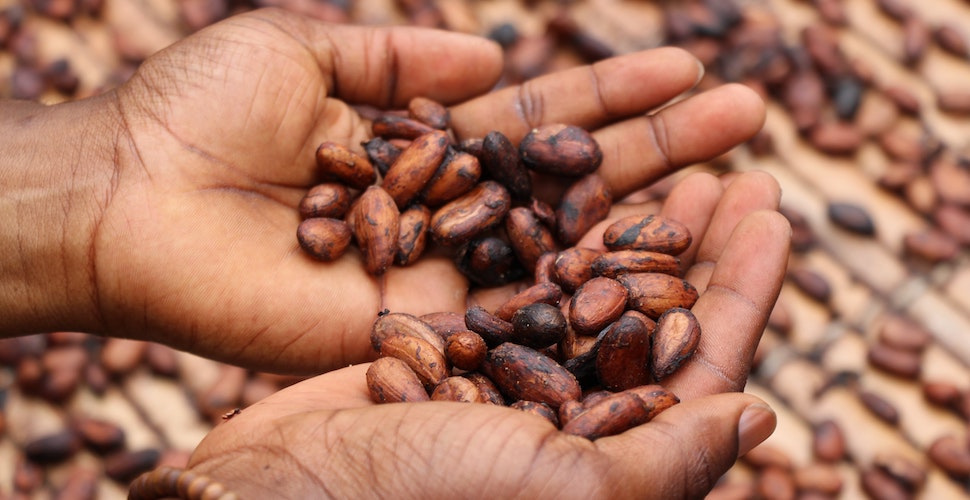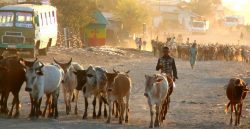Writing for The Conversation, researcher Michael Odijie posits that slavery in cocoa harvesting is a centuries-long problem.
He notes that “Some things have changed since then. Modern slavery primarily involves the trafficking of children, who are treated as a “disposable” source of labor. However, some things remain the same. Cocoa buyers and chocolate manufacturers still use various strategies to deny, deflect and divert when the issue of child slavery is raised.”
Awareness is growing but slavery persists
Indeed, despite widespread acknowledgment that child slavery exists in cocoa harvesting, the multibillion-dollar chocolate industry continues unimpeded. Just this year, advocates were disheartened by the loss of a lawsuit against chocolate giants Nestle and Cargill.
As Odijie points out, “sustainability” efforts by chocolate companies really do little to address child forced labor but actually boost productivity – a win for the company and not the exploited.
The roots of child slavery in cocoa farming
According to International Cocoa Initiative, cocoa farmers earn less than $2 a day — below the World Bank’s poverty line — which is part of the reason why cheap child labor is employed in the industry.
In addition to poor wages, Odijie points to lack of land access and labor shortages as the root causes of the issue.
He writes,
These conditions arise from changes in the ratio of labour to land needed to continue cultivating cocoa. The availability of forestland is the decisive factor.
Cocoa farming once involved the consecutive phases of boom and bust, followed by a shift to a new forest area (production shift), a different product in the same area (diversification) or a different system of cocoa cultivation requiring extra production factors. Studies of cocoa cultivation in West Africa have provided evidence of planters’ migrating to new forest after exhausting existing forestland, resulting in shifts in production centres within and between countries.
However, accessing new forestland is becoming ever more difficult, and far more labour is needed to replant cocoa than to plant on pioneer forest soil.
This labour problem is particularly pronounced in cocoa cultivation areas that depended on migrant labour in the past (such as Ivory Coast). Here, a reduction in migration over time, coupled with deforestation, has resulted in a labour crisis: although post-forest cultivation requires more labour than pioneer planting, less labour is now available. To continue cultivating cocoa, planters in these areas have turned to cheaper sources of labour, such as family members and children.
An estimated 1.6 million children work in the cocoa industry, which is largely centered in Ghana and the Ivory Coast. But big brands still aren’t doing enough to ensure this tainted cocoa doesn’t make it into their supply chains. For a product associated with luxury and indulgence such as chocolate, the exploitation and abuse of children in its production is particularly disturbing.
Call for an end to child slavery
Join our campaign calling on chocolate companies to act now to end child slavery in their supply chains.








Freedom United is interested in hearing from our community and welcomes relevant, informed comments, advice, and insights that advance the conversation around our campaigns and advocacy. We value inclusivity and respect within our community. To be approved, your comments should be civil.
I am in my early 80s. I worked in the global development and humanitarian assistance arena for decades and saw first hand the systemic economic abuse that is everywhere. The chocolate supply chain has been gamed for ever by the brand name companies that market fancy chocolate to affluent customers using sophisticated rules about the trade that is allowed and free of duty and the trade that attracts punitive duties. Growing cacao creates tiny revenue, selling processed chocolate earns a lot.
Maybe instead of just asking people to sign a petition it would be more effective to call for a worldwide boycott on all chocolate brands that do not effectively tackle the issue. I may be wrong, but it seems to me that if there is a shortage of workers it is because nobody is willing to work for starving wages. It seems inhuman to me that in rich countries we are willing to pay a lot while children who grow cocoa are condemned to exploitation while they are young and to poverty as adults.